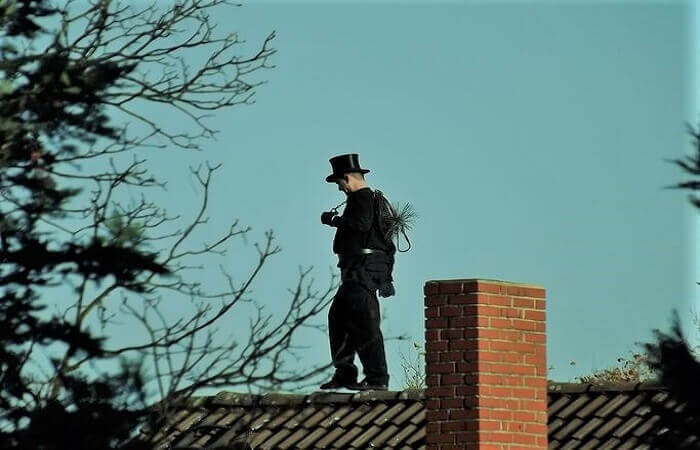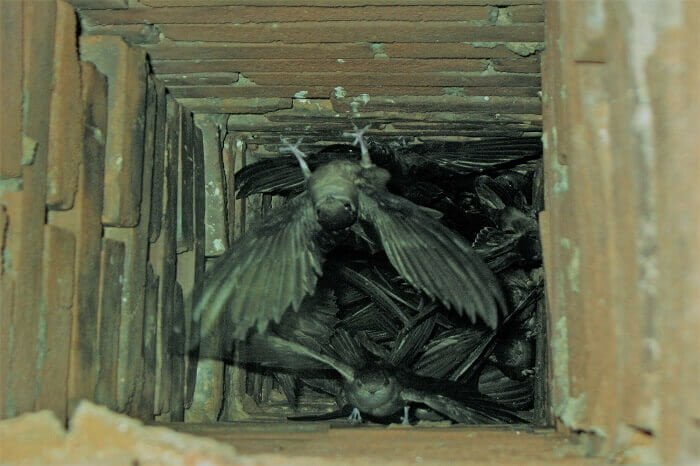Chimney Inspection: Why And When Must?
Disclosure: As an Amazon Associate, I earn from qualifying purchases. Learn more
Did you know that your chimney could be a fire hazard? The national fire protection association states that “A poorly maintained or uninspected chimney is one of the leading causes of residential fires in America.” that’s why it is so important to have your chimneys inspected and cleaned at least once a year.
A professional cleaner will use specialized tools like brushes, snorkels, vacuums, or coiled rods to remove buildup from the inside of the chimney that you can’t see on top because it’s either too high up there for you to reach them with your hand without hurting yourself.
A chimney inspection can be a very important part of home maintenance. Many things may need to be looked at such as the flue, damper, and crown. The inspection is done from the top down where they start by looking at the roofing material. It is important to make sure your chimney has no cracks or gaps in it so that if there were ever a fire, smoke would not escape into your home.
A lot of people don’t think about their chimneys until something goes wrong like when they experience an issue with their air conditioner or furnace and realize how much heat was coming up through their floorboards because of the lack of insulation!
Why You Should Have Your Chimney Inspected?
When it comes to protecting your home, a chimney is one of the most important things you need. Not only does it keep all those harmful chemicals and gases out, but also high temperatures can cause damage to the foundation of your house. You may think that fire-resistant materials are used in construction as well as metal flue liners or dampers made for protection from these dangers.

The mortar between bricks along with tile flues themselves can deteriorate due to old age which puts our homes at grave risk from various dangerous possibilities such as increased levels of carbon monoxide poisoning or destructive fires breaking loose anytime soon after they start up again (or even worse). There are also some more logical reasons why a chimney needs to be cleaned regularly.
The Flue May Have Cracks
Cracked flues are an unwelcome intrusion into your home. This can lead to heat and embers reaching combustible materials or toxic fumes entering the house, depending on which way you look at it! Over time a cracked flue will likely develop more cracks from excessive exposure, as well as decay after contact with water droplets (especially when not properly covered).
You’ll also want a professional chimney inspector to check for damage so that one day soon your family won’t have their lives affected by these intruders in any of those two ways again.
Your Masonry May Have Deteriorated
After years of heating and varying weather temperatures, masonry chimneys can deteriorate. Cracks may start to develop in the masonry as a result; this is why an inspection should be performed on your chimney regularly! A trained professional will analyze every inch of your structure, looking specifically for signs that could indicate trouble down the line.
More Creosote May Build-up
Creosote is a dark, oily substance that builds up in your chimney when you burn wood or other solid fuels. If left to accumulate and create an unsafe situation for fire-burning purposes, it can lead to a dangerous and costly chimney fire. But if inspected before burning again the creosote will be removed beforehand so as not to cause any problems!

Birds/animals Can Nest in Chimneys
Birds and other wild animals may use your chimney as their home, which the homeowner might not know about. This can cause a fire because of the sooty residue they leave behind, which is especially dangerous if it builds up inside the fireplace or stove’s flue pipe from where smoke exits to be carried away by suction through an exhaust system on top of the house.
Chimney or flue may not properly be covered
If your chimney or flue is not properly covered with a flue cap, water will enter and cause rapid deterioration. A professional chimney sweep can check your masonry’s condition and recommend appropriate repairs to ensure long-term durability.
Annual Inspection
It is important to inspect your chimney at least once a year. There are many benefits to getting your chimney inspected before using it. Getting a yearly inspection will make sure that your chimney does not sacrifice efficiency and performance, while also giving an idea of what repairs may be needed to keep the fireplace running smoothly.
Chimney Inspection Level
It’s important to inspect your chimney before winter arrives. Chimney inspections are important to make sure that your chimney is safe and working properly. There are three levels of inspection that may be needed depending on the condition of your fireplace, stove, or boiler.
A Level 1 Inspection
A level 1 chimney inspections are the most common type of inspection and can be as simple or extensive as you wish. A level 1 inspection is enough for those who plan to use their appliances and chimneys like they always have with no plans of changing anything in terms of how it has been operated before.
For more intense investigations into your appliance’s structure, connections between parts will also need to be inspected by a certified technician from chimney inspection services so that any problems would not go unnoticed when repaired later down the road. It will only check for general safety and structural integrity.
A Level 2 Inspection
A level 2 inspection conducted by a certified chimney sweep offers an in-depth inspection of the fireplace and chimneys. The NFPA level 1 is not enough to identify potential problems with your home’s fire safety, so if you’re looking for more detailed information or want to make sure that all possible issues are caught before they become dangerous hazards, this level will help accomplish those goals.
Inspection includes checking for cracks or holes in the wall, missing mortar joints, cracked fire bricks, damaged crowns or caps, as well as any other hazardous conditions on the exterior of your chimney.
A Level 3 Inspection
If you believe that your chimney could have serious structural defects, it is best to contact a certified chimney sweep. A level 3 inspection will usually occur when the construction of the chimney becomes necessary for continued or renewed use due to potentially unseen problems.
The level 3 inspection could include opening an interior wall so that hidden parts can be accessed and inspected by our certified team. This level of inspection normally occurs after more serious problems have been identified and only if it’s necessary to determine how best to repair them.
How Often Should I Have My Chimney Swept?
It all depends on the condition of your fireplace and chimney. But the general rule of thumb for most homeowners is once every year or two. There are some extreme cases where sweeping may need to be done more frequently, but these would only be in situations with heavy use (like multiple fireplaces) and/or neglected care over a long time.
Many homes owners’ misconceptions are that, if your chimney isn’t in use, it shouldn’t be cleaned and maintained. But a dirty chimney can lead to dangerous conditions like soot buildup and creosote deposits which could cause a fire or carbon monoxide leak.
With this in mind, it’s important to consult with an expert about the frequency of cleaning required for your specific needs. So, what does that mean exactly? It means that every situation is different depending on how much smoke or fumes are coming out of the fireplace.
Usually, without regular maintenance, soot and creosote buildup will restrict the airflow in your chimney, which can lead to dangerous conditions like house fires. The national fire protection association NFPA recommends that you get your fireplace cleaned at least once every year for safety reasons. If you’re not sure when it last had a cleaning, check with an expert before using the fireplace again this winter.
How Much Is a Chimney Inspection?
Different types of chimneys require different inspections. One inspection that is often conducted in a home with an operational fireplace can cost as little as $100 for a basic visual evaluation, but another type of standard and basic chimney inspection will vary based on the roof’s accessibility to determine what needs to be inspected.
In general, you should plan on spending about $300-$600 or up to 400 overall, although this might not include other potential fees such as repairing any damage found during the inspection. Standard and basic chimney inspection costs vary depending on your chimney type and chimney inspection, but generally, you can plan to spend around 100 to 250 dollars.
Frequently Asked Questions (FAQs)
How Often Should a Chimney Be Inspected?
A chimney should be inspected at least once a year. However, more frequent inspections may be necessary if the chimney is used frequently or if it is located in an area with a high risk of wildfires.
What Should Be Done During a Chimney Inspection?
A chimney inspection should include a visual inspection of the chimney structure and flue, as well as a check for any blockages or debris. The chimney cap and spark arrestor should also be checked to ensure they are in good condition.
What Are the Signs That a Chimney Needs to Be Inspected?
There are several signs that indicate a chimney needs to be inspected, including visible cracks or damage, excessive soot or smoke, and strange noises coming from the chimney.
What Are the Risks of Not Inspecting a Chimney?
If a chimney is not inspected on a regular basis, it could develop serious damage that could lead to a fire. Additionally, a blocked or obstructed chimney could cause carbon monoxide to build up inside the home, which can be dangerous to the occupants.
Who Should Perform a Chimney Inspection?
A chimney inspection should be performed by a qualified professional. Homeowners should not attempt to inspect their own chimneys, as they could miss important signs of damage or blockages.
Conclusion
Chimney fires are a major cause of house fires in the united states. It’s important to have your chimneys inspected regularly by professionals so you can avoid such disasters and save on home insurance premiums at the same time!
There are many reasons why you should have it done, and they don’t all relate to safety. A qualified technician can help identify potential problems before they become costly disasters that could put lives at risk.
Discover New Articles: See Our Latest Updates
